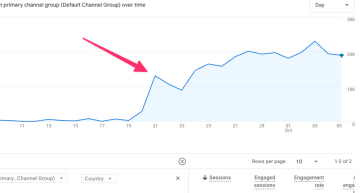Local SEO tips using Single Domain and Multiple Domains.
Quick Summary of Contents
For a small business, the local market for their line of business can be quite a competitive and saturated market.
From traditional advertising avenues to search marketing and other online advertising venues, small businesses are trying to get the biggest bang for their buck when it comes to driving new business.
For some, it’s a matter of keeping the doors open.
But like any small business that relies on the web for new customers or their website to act as a 24 by 7 by 365 online salesperson, there is always the question of what is the most effective path to take in optimizing one’s website for local SEO.
One crowd believes in using a single domain to rank local SEO, while others believe in multiple domains to boost local SEO rankings.
So which party is right or wrong? Or are both parties right and wrong?
Today, I’ll take a moment to outline a few local SEO scenarios for small businesses and also discuss the pros and cons of local SEO using single domains and multiple domains.
Local SEO tips using a Single Domain.
Most small businesses will typically have a single domain name they use as their primary domain to host their website.
For any and every advertising opportunity the small business participates in, they tend to use this single domain.
This single domain is typically the business name or a variation of the business name, although it could also be one of the following:
- city+keyword
- keyword+city
- state+keyword
- keyword+state
- exact-match domains that use niche and business-specific keywords
Again, 90% of businesses are using a single domain made up of their business name or a variation of the business name.
A typical small business will tend to serve a primary city and surrounding cities of up to a 50-mile radius, depending upon the type of services or products offered by the business.
For a business to rank well across major search engines for each city, it’s recommended that the business creates custom city pages.
For example, let’s say you have a lawn mowing business in Austin, Texas, that uses the single domain BestGreenLawns.com.
In addition to serving your customers in Austin proper, you also service Round Rock, Cedar Park, Pflugerville, Georgetown, and Leander.
So for each city, you could simply create a URL/page like such:
- BestGreenLawns.com/Austin
- BestGreenLawns.com/RoundRock
- And so on…
If you wanted service pages for each city, you could use a subdirectory for each service and product page offering like such:
- BestGreenLawns.com/Mowing/Austin
- BestGreenLawns.com/Landscaping/RoundRock
- And so on…
You could also use subdomains too like the following:
- Austin.BestGreenLawns.com
- RoundRock.BestGreenLawns.com
- And so on…
To rank locally for each city, your local SEO plan should consist of having pages for each of the cities.
Now this doesn’t mean creating a page of the same exact layout, content, or images for each city, as this will get you into trouble with search engines — walking the line closely on duplicate content.
Don’t get caught using the same content and only switching out the city name. It’s suggested that you use a unique layout, content, and images for each city page.
Don’t forget to optimize and include the city name in URLs, page titles, page descriptions, page header tags, and content.
Local SEO tips using a single domain tend to be a little more manageable for small businesses that are strapped for time and money.
If you’re not as tech-savvy in regards to managing multiple websites and SEO in general, then I tell most to lean towards keeping their local SEO efforts focused on using a single, primary domain.
Local SEO tips using Multiple Domains.
Although there are many small businesses that solely focus their local SEO efforts on using a single domain, then there are those who step up their game and use multiple domains in addition to their primary domain.
Yes, I know you’re thinking, “Is it, not an SEO penalty to use multiple domains?”
Well, the answer is “yes” and “no”, and which answer I give you depends on your intent of use.
There are many small businesses that will attempt to use multiple domains as their local SEO strategy only to try to boost their primary website’s backlink profile and search rankings.
Those who use multiple domains with this intent are indeed in violation of search engine policy and definitely walking the thin line of SEO link wheels.
However, conversely, it is possible for a small business to use multiple domains, not link any domains to one another and a primary website, and fully comply with search engine policies.
Sometimes small businesses with a wide range of services and products will use multiple domains to target and focus on a specific local niche.
Let’s use our previous examples of BestGreenLawns.com.
The domain itself is broad and could be a brandable domain with a global presence.
So instead of using a single domain, a business may choose to acquire a host of niche-specific domains to build websites on to rank locally for their given niche.
An example would be using domains like:
- AustinMowing.com
- RoundRockMowing.com
- GeorgetownMowing.com
- PflugervilleMowing.com
- LakewayMowing.com
- LibertyHillMowing.com
- CedarParkMowing.com
- LeanderMowing.com
- SanMarcosMowing.com
- NewBraunfelsMowing.com
- KyleMowing.com
- BudaMowing.com
- And the list goes on…
Each domain name would have associated with itself a uniquely built website, layout, content, and images.
Also, the domain(s) cannot be linked to one another or funnel users to the same destination (i.e. linking your primary website).
In addition, it is recommended that each website be hosted on a unique IP address and web hosting account.
Which strategy is best for your business?
This question I can’t answer for you. You’ll have to answer this for yourself.
The chances of ranking for a specific city using city+keyword or keyword+city domains are greater than trying to rank a single domain for a variety of cities.
Both methods are possible and could very well take more or less time, depending on how saturated the search market is in the given niche.
From a local SEO perspective, the upside to the multiple-domain approach is that search engines treat each domain as a completely different entity when ranking.
The downside to using a multiple-domain approach for local SEO is that a small business could be trying to manage and create content for 10 or more websites at once.
It is quite easy to manage multiple websites using content management systems like WordPress or Joomla these days.
In fact, hosting companies such as GoDaddy, A2 Hosting, and InMotion Hosting offer WordPress Hosting Plans that remove ALL the heavy technical management and maintenance once needed for very low and affordable pricing, yet at very fast speeds and high quality.
Such plans lower the entry bar and allow you to focus on what you do best: growing and operating your website without technical concerns impeding you.
However, managing multiple domains can be expensive in both time and money to create and manage uniquely designed websites with value-add images and content.
One has to be somewhat tech-savvy to pull off managing multiple domains that rank well locally in search engines.
In addition, you’ll need deep pockets and good success in finding available city+keyword premium domains for your niche.
Go with what best meets your small business’s local SEO needs.
Nevertheless, local SEO using a single domain and multiple domains is different for every business and business niche.
As a small business owner, you must perform your due diligence and understand the pros and cons of single-domain and multiple-domain local SEO.
You can be successful with either or both just as well as miserably fail with either or both.
How well you adhere to sound SEO principles regarding your content marketing strategy and off- and on-page optimization tactics and techniques will set you apart.















Hi Alvin, great information! Is this information still valid or has Google tightened restrictions on having multiple domains since the time that you wrote this? I have a pet sitting and dog walking business in New Orleans. My main website is poodleroo.com, but my business coach advised that I buy several domains with local keywords, then build a landing pages for each. So I purchased neworleansdogwalker.com, neworleansdogwalking.com, etc. today, but now I’ve been reading about doorway sites and I’m afraid I’m going to get myself in trouble with Google. Interested to hear your thoughts!
Are you new domains (websites) linked to your primary domain? If you are using the pages to rank in search engines for the sake of linking to your primary website, then you’re quite possibly in trouble. If your domains with websites have a different design, content, and do not link to your primary domain, then all is well. Read more about doorway pages at https://support.google.com/webmasters/answer/2721311?hl=en
I haven’t set them up yet, so nothing has happened. I guess I’m just going to have to make a couple of nice stand alone mini sites. Now I wish I would have done this research before buying several domains. Live and learn, right? 🙂 Thanks for your input!
You could always simply redirect the domain names to your primary website. I redirect a fair share of domains that have been hand registered or purchased search-safe expired domains to this blog. For instance, type in DallasLocalSEO.com.
You would be surprised at how many geo service domains like the ones you registered are type into browsers on a daily, bypassing search engines and landing directly at your website should you redirect the domain to your website. 😉
Read up on Type-in Traffic (http://localhost/ksc/?s=type-in+traffic) and Generating qualified traffic using local domain names (http://localhost/ksc/generating-qualified-traffic-using-local-domain-names.html).